Key takeaways:
- Implementing biodegradable soaps and water recycling systems significantly improves water quality and reduces consumption, enhancing environmental responsibility and customer satisfaction.
- Embracing sustainability fosters team unity, innovation, and job satisfaction, creating a purpose-driven workplace that resonates with both staff and customers.
- Encouraging staff engagement through open dialogue, recognition of contributions, and gamified competitions elevates commitment to sustainability initiatives.
- Measuring success involves not only tracking environmental metrics but also assessing employee engagement, emotional investment, and the broader community impact of sustainability practices.
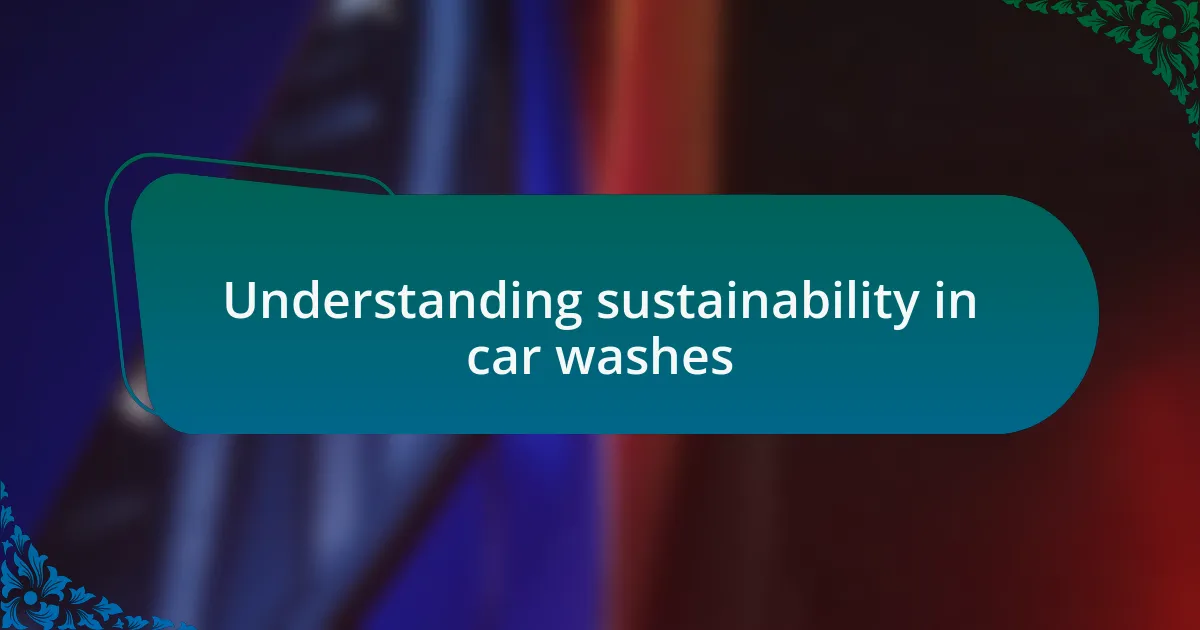
Understanding sustainability in car washes
Understanding sustainability in car washes means recognizing the environmental impact our operations can have. In my experience, even small changes can lead to significant benefits. For instance, I remember when we switched to biodegradable soaps; not only did our water quality improve, but customers also appreciated our commitment to the planet.
Have you ever thought about how much water traditional car washes consume? It’s staggering! I was shocked to learn that a single wash typically uses gallons upon gallons of water. By implementing water recycling systems, we’ve reduced our usage drastically, which ultimately helps our bottom line while being environmentally friendly.
Sustainability isn’t just a trend; it’s a necessity in our industry. Personally, I felt inspired when we introduced electric car wash equipment. It felt great to reduce our carbon footprint and inspire my team to think creatively about their roles in supporting a sustainable future. These changes aren’t just about compliance; they’re about creating a culture where we all feel responsible for the environment.
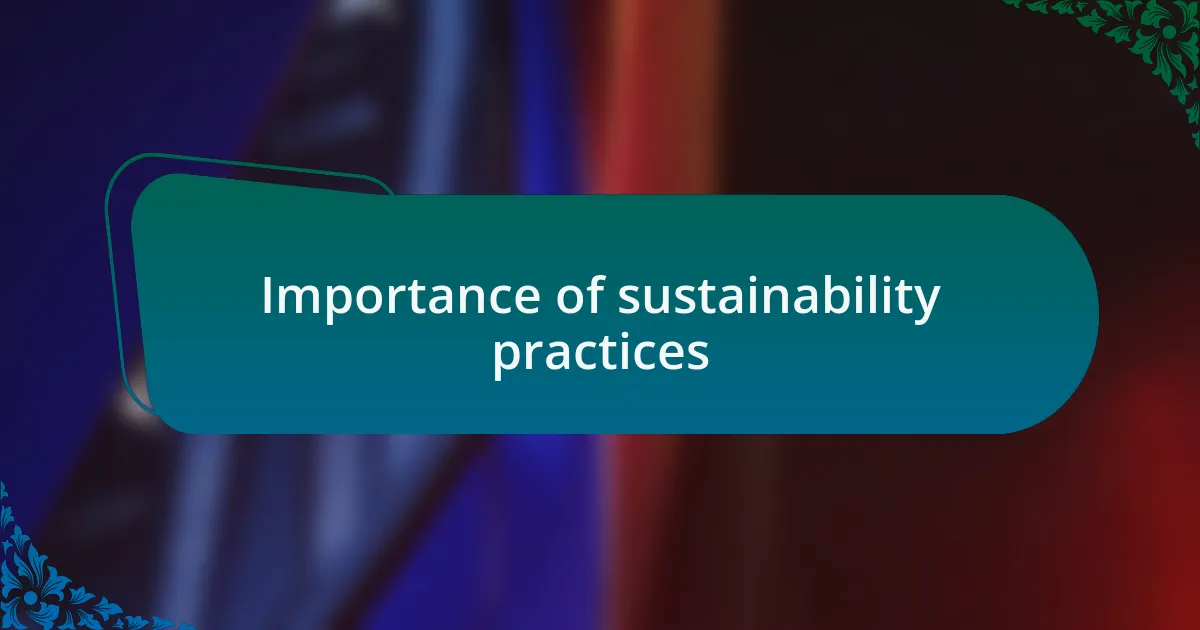
Importance of sustainability practices
Sustainability practices are crucial because they directly impact our environment and future. I still remember the day I felt a sense of unity among my team when we decided to go paperless in our operations. The joy in their voices as they shared ideas on digital solutions was a moment I won’t forget. It was proof that sustainability can spark innovation and bring people together toward a common goal.
Have you considered how much waste is generated from traditional car wash methods? I once calculated our waste output and was taken aback. By moving towards sustainable materials, like recyclable packaging, we’ve not only diminished our landfill contributions but also increased customer loyalty. Surprisingly, many customers appreciate businesses that value eco-friendly practices, making sustainability a win-win situation.
The importance of embracing sustainability practices can’t be overstated. I recall a heartfelt discussion with a team member who expressed how knowing we’re part of something bigger gave her job more meaning. It made me realize that when we prioritize sustainability, we don’t just enhance our operations; we create a purpose-driven workplace that resonates with both our staff and customers. Isn’t that something we all aspire to achieve in our careers?
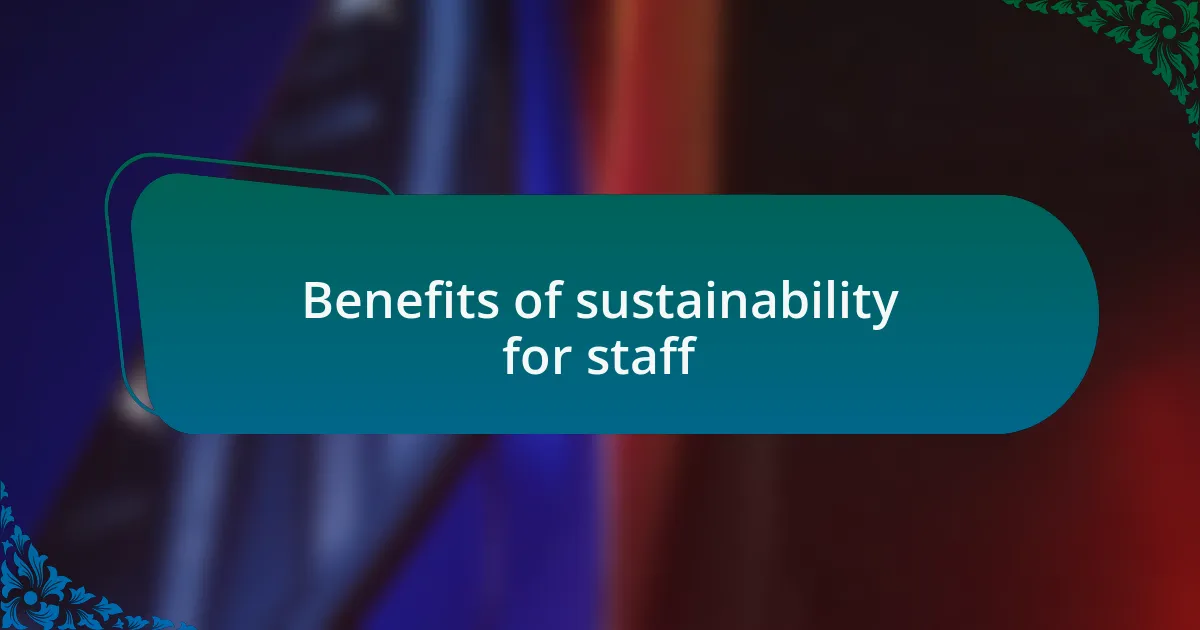
Benefits of sustainability for staff
Creating a sustainable work environment can significantly enhance job satisfaction. I remember when we implemented a green initiative that encouraged staff to suggest eco-friendly practices. The excitement in the air was palpable, and the sense that their contributions truly mattered transformed our team dynamic. It’s amazing how a little recognition can empower employees and foster a deeper connection to their work.
Another key benefit I’ve seen is improved team morale. After introducing a program where staff could participate in local environmental projects, I was struck by how collaboratively they worked together outside of the usual work tasks. It not only strengthened their bonds but also instilled a sense of pride in being part of a company committed to making a difference. Have you witnessed the powerful impact of shared values in a team?
Training programs focused on sustainability can also provide invaluable professional development opportunities. I remember one of my team members who took on a leadership role in our sustainability efforts, which not only advanced her career but also transformed her perspective on our industry. Offering staff these pathways to learn and grow encourages an environment where everyone feels motivated to innovate, ultimately benefiting the entire organization. Wouldn’t you agree that growth is something we should aim for at all levels?
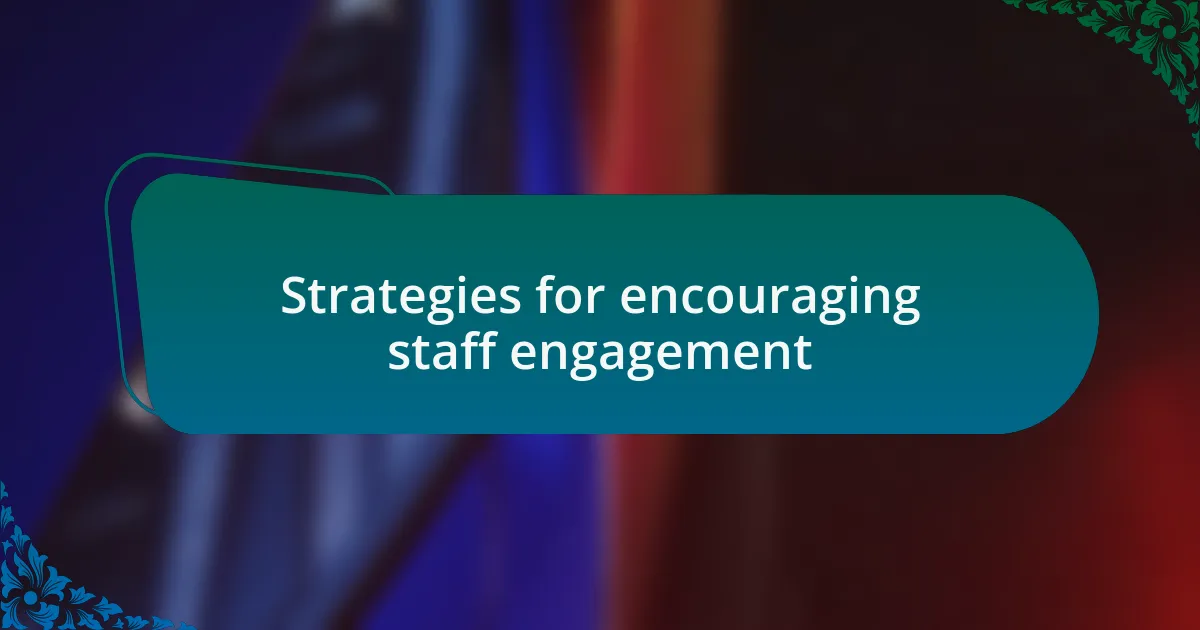
Strategies for encouraging staff engagement
One effective strategy I’ve used to encourage staff engagement in sustainability is creating a platform for open dialogue. I initiated regular brainstorming sessions where everyone could share their ideas on green practices. It was really something to see them light up as their creativity flowed. This sense of ownership not only energized the team but also made sustainability a shared journey rather than a top-down mandate. Have you ever noticed how powerful it can be when people feel their voices are heard?
Another approach that worked wonders was to gamify our sustainability efforts. I remember launching a friendly competition where teams could earn points for implementing eco-friendly practices. The enthusiasm was contagious! Employees eagerly engaged in reducing waste and conserving resources, all while fostering a fun, competitive spirit. Isn’t it fascinating how a little playfulness can lead to serious commitment?
Additionally, recognizing and celebrating sustainability milestones has played a key role in keeping staff engaged. I started highlighting individual contributions during our team meetings and even created a ‘Sustainability Champion’ award. The joy on my colleagues’ faces as they received acknowledgment for their efforts was heartwarming. It makes me wonder—could recognition be the secret ingredient to keep motivation soaring?
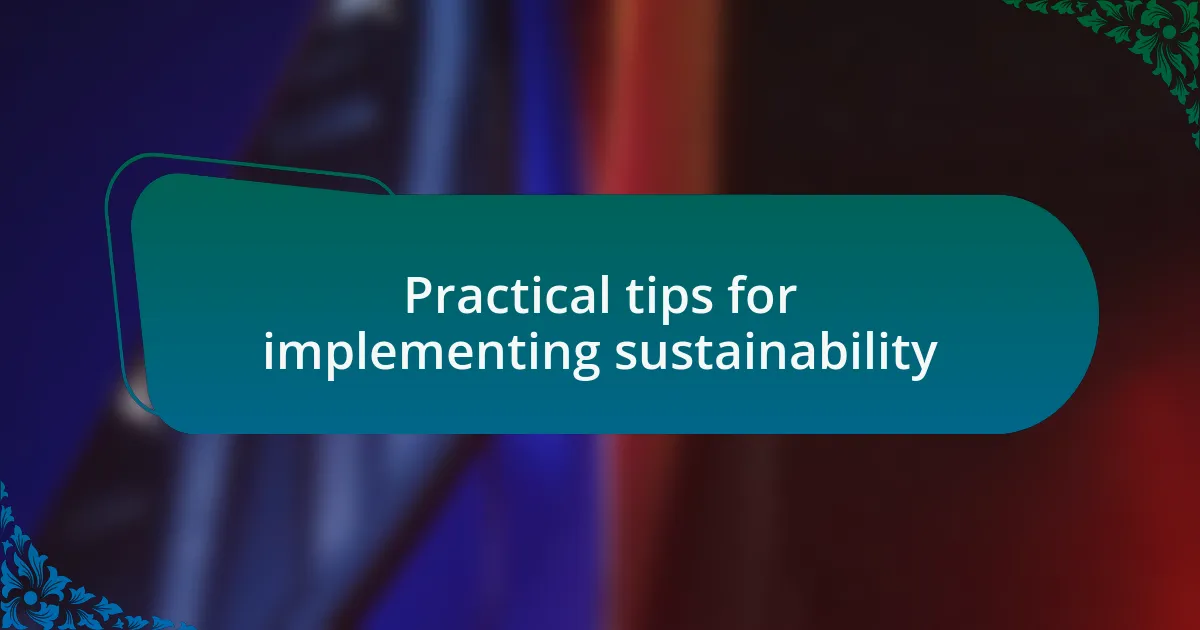
Practical tips for implementing sustainability
To implement sustainability effectively, I recommend starting with small, achievable goals. For instance, I encouraged our team to adopt a “zero waste” policy in our daily operations. We began by minimizing single-use plastics and gradually transitioned to reusable containers. This step not only made a noticeable difference in our waste output, but it also sparked conversations among staff about the impact of their choices.
Another practical tip is to provide ongoing training and resources. I fondly recall organizing a workshop with an expert who talked about sustainable practices specific to our industry. The insights shared were eye-opening, and I could feel the team’s excitement about what they could do next. Have you ever felt that surge of motivation when learning something new that aligns with your values?
Lastly, integrating sustainability into our everyday routines can make a world of difference. I suggested to my team that we should hold monthly sustainability challenges, like a car wash efficiency improvement month. Sharing results and celebrating our achievements together reinforced our commitment. Did you know that these consistent, collective efforts not only strengthen teamwork but also amplify our positive impact on the environment?
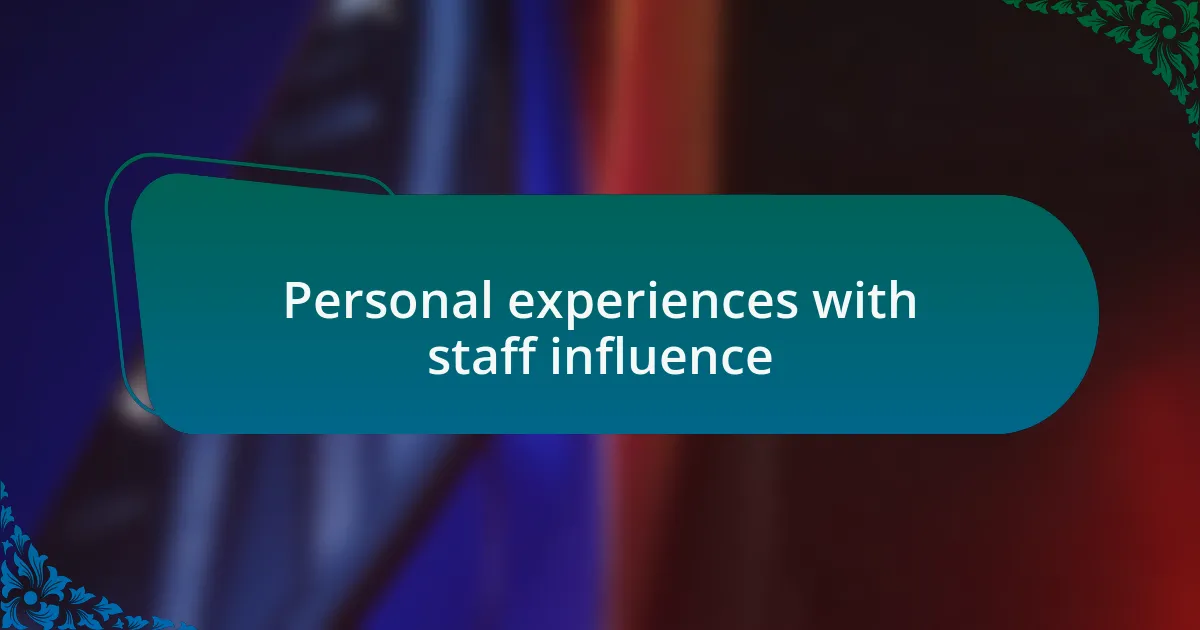
Personal experiences with staff influence
When I first introduced the concept of sustainability to my team, I saw a shift in dynamics that I didn’t expect. One day, during a casual team meeting, I encouraged everyone to share their thoughts on how we could incorporate eco-friendly practices into our work. The enthusiasm was palpable as one staff member proposed using a water-recycling system for our washes. It struck me how a single suggestion not only highlighted their engagement but also inspired others to think creatively about sustainability.
I vividly remember a particular instance when a team member took it upon themselves to create informative posters about the benefits of eco-friendly cleaning products. Their passion was contagious, and it felt great to see them championing the cause as if it were their own. It made me realize that empowerment can ignite a spark in employees that motivates them to go beyond expectations. Have you ever witnessed someone take ownership of a project and watch how that fuels their drive?
As we rolled out our sustainability initiatives, I noticed a transformation in the team culture. We started sharing our personal stories about why sustainability mattered to us. This openness forged deeper connections among us. One employee shared their family’s commitment to reducing waste, which resonated with many of us. Hearing these experiences led to a collective commitment that went deeper than policy—it became part of who we are as a team.
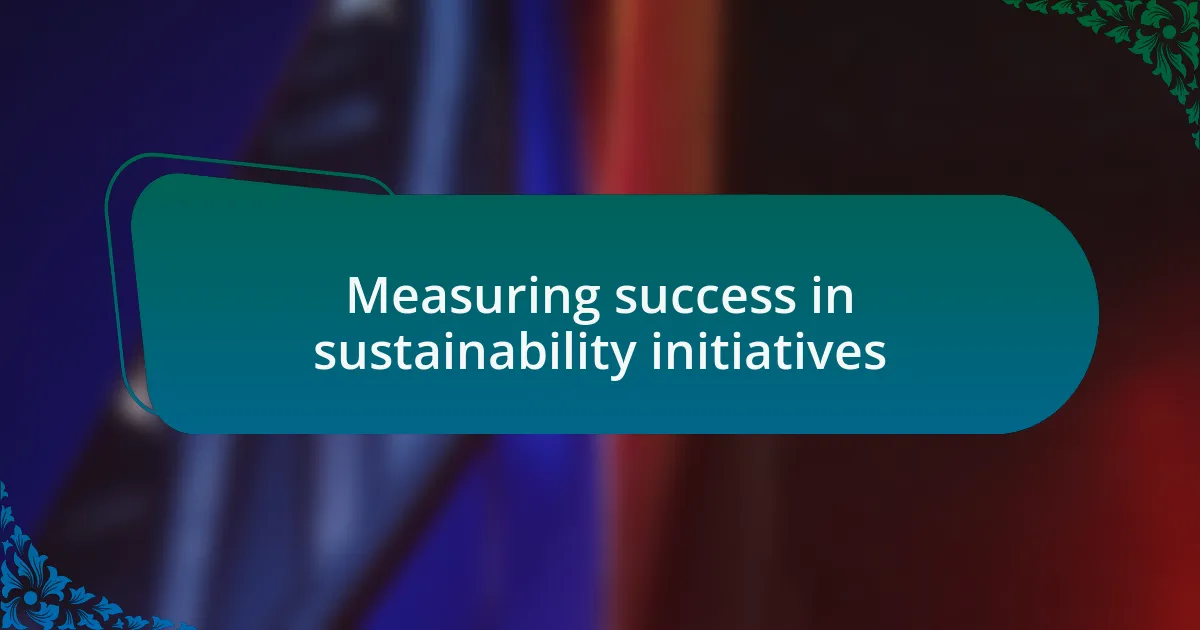
Measuring success in sustainability initiatives
Measuring the success of our sustainability initiatives required more than just tracking water usage or energy consumption. I remember the first time I saw our team rally around a shared goal; we set specific benchmarks for reducing our environmental footprint and celebrated small victories together. It was exhilarating to see how the mere act of recognizing achievements, no matter how minor, fostered a sense of pride like no other.
I implemented a feedback system to gather insights from my staff about our sustainability efforts. One day, while reviewing the responses, I stumbled upon a heartfelt comment from a team member who noted how they felt empowered to educate customers about our greener practices. It struck me that this engagement wasn’t just about metrics; it was deeply personal. Could measuring emotional buy-in and commitment be just as vital as examining hard numbers?
As we refined our approach, we began to track employee participation in sustainability training sessions. Each person’s involvement painted a broader picture of our collective commitment. One staff member shared that after participating in the training, they began practicing sustainable habits at home, prompting their family to join in. This ripple effect underscored that our initiatives weren’t limited to the workplace—they were inspiring broader community change. Can you imagine how impactful that is for building a culture of sustainability?